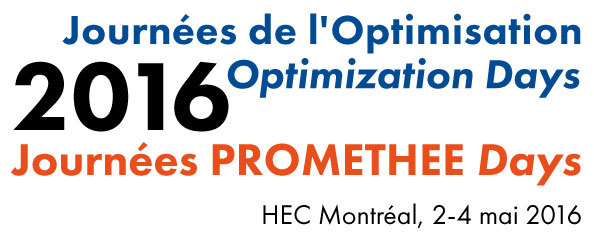
Journées de l'optimisation 2016
HEC Montréal, Québec, Canada, 2 — 4 mai 2016

WA2 Optimal Allocation
4 mai 2016 10h30 – 12h10
Salle: Saine Marketing
Présidée par Koukla Azeuli
3 présentations
-
 10h30 - 10h55
10h30 - 10h55Constrained TCP-nets
A Conditional Preference Network (CP-net) is a widely used graphical model for expressing qualitative and conditional preferences over attributes values. CP-nets have been recently extended to Tradeoffs-enhanced Conditional Preference Networks (TCP-nets) in order to capture the relative importance among attributes. In this paper, we extend the TCP-net to hard constraints and call the new proposed model constrained TCP-net. More precisely, the constrained TCP-net has the ability to represent and manage a given application under constraints as well as qualitative and conditional preferences over the attributes and their values. Solving the constrained TCP-net consists of finding the set of Pareto optimal solutions satisfying all the constraints and maximizing all the preferences. This task is addressed in this paper using a variant of the branch and bound algorithm enhanced with constraint propagation and variable ordering heuristics.
-
 10h55 - 11h20
10h55 - 11h20Multi-objective optimization in multi-attribute combinatorial reverse auctions
Combinatorial Reverse Auctions (CRAs) often involve multiple conflicting objectives. Winner determination in CRAs is a NP-complete problem. Considering multi-unit and multi-attribute along with buyer's and sellers' constraints adds more complexity. Our ambition is to develop a multi-objective genetic algorithm to find the Pareto-optimal solutions for our new winner determination problem.
-
 11h20 - 11h45
11h20 - 11h45Allocation optimale des budgets de campagne en marketing interactif
Nous proposons un modèle non-linéaire d'optimisation de campagnes publicitaires en ligne à partir de données de navigation partielles. Ce modèle permet de déterminer les valeurs d'enchères à miser sur les mots-clés dans les moteurs de recherche permettant d'améliorer la rentabilité de la campagne. Nous avons également développé un algorithme de résolution basé sur la recherche taboue.
